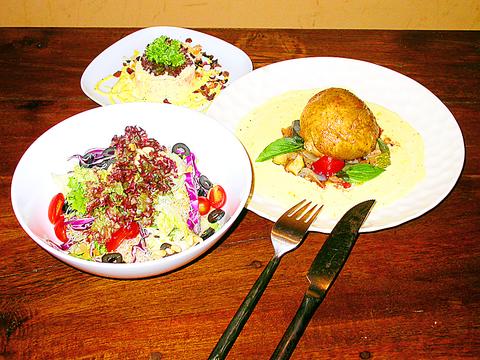Walking to VVG Bistro is like visiting the home of an old friend. Passing through the dense foliage enshrouding the entrance, you can hear the banter of the half-dozen staffers, patrons and Grace Wang, the good-humored and charismatic proprietor who is the major source of the restaurant's intimate atmosphere.
The casual yet tasteful decor and mellow jazz tracks invite diners to take their time enjoying their dinner.

PHOTO: VICO LEE, TAIPEI TIMES
Set up three and a half years ago by a group of interior designer and architect friends who enjoy good food as much as they do good architecture, VVG used to be relatively exclusive. Its food, made by these amateur chefs, was decent but didn't live up to its name -- an acronym meaning "Very Very Good."
Wang took charge of the place six months ago. A former senior marketing specialist, she expected a great deal of the restaurant. She hired a graduate from Le Cordon Bleu, France's famous cooking school, as the chef, who then designed its menu of creative dishes. "We call these dishes kung fu dishes, meaning a lot of work has been put into them. They require careful and meticulous preparation," Wang said of VVG's mainly Italian cuisine.
Roast stuffed chicken thigh with mushrooms (NT$360) is an example. The fresh and tender chicken thigh is first skinned, degreased and flavored. The skin is then prepared and wrapped back around the meat. The ensuing juiciness of the meat is enhanced by a spiced cream sauce. Great care has been taken with the accompanying vegetables. Stewed eggplants, sweet peppers and sour cucumbers seasoned with an array of herbs leave a lingering fragrance in your mouth.
"The most important element in cooking is the balance. .... The effect when you bite into the food and how it tastes is crucial to good cooking. For that, it takes quality ingredients. Only after achieving this do we talk about the music, decor and the atmosphere of the restaurant," Wang said.
Another kung fu dish is salmon tartare with egg salad (NT$250), an ingenious appetizer. Fresh salmon is blended with egg to create a rich but refreshing taste. Added to that is a light cream sauce sprinkled with dried fruit and bits of flowers used in fruit tea -- a unique touch of creativity.
VVG's list of drinks is one of the city's most interesting. Lassi (NT$180) with pineapple or mango is a popular choice. Indian spiced milk tea (NT$160) is flavored with nutmeg and boiled for up to three hours to bring out the taste of both of the main ingredients. As winter is around the corner, Wang recommends vin chaud (NT$220), stir-boiled fine red wine with cinammon, cloves, lemon juice and other flavorings.

Beijing’s ironic, abusive tantrums aimed at Japan since Japanese Prime Minister Sanae Takaichi publicly stated that a Taiwan contingency would be an existential crisis for Japan, have revealed for all the world to see that the People’s Republic of China (PRC) lusts after Okinawa. We all owe Takaichi a debt of thanks for getting the PRC to make that public. The PRC and its netizens, taking their cue from the Chinese Communist Party (CCP), are presenting Okinawa by mirroring the claims about Taiwan. Official PRC propaganda organs began to wax lyrical about Okinawa’s “unsettled status” beginning last month. A Global

Dec. 22 to Dec. 28 About 200 years ago, a Taoist statue drifted down the Guizikeng River (貴子坑) and was retrieved by a resident of the Indigenous settlement of Kipatauw. Decades later, in the late 1800s, it’s said that a descendant of the original caretaker suddenly entered into a trance and identified the statue as a Wangye (Royal Lord) deity surnamed Chi (池府王爺). Lord Chi is widely revered across Taiwan for his healing powers, and following this revelation, some members of the Pan (潘) family began worshipping the deity. The century that followed was marked by repeated forced displacement and marginalization of

Music played in a wedding hall in western Japan as Yurina Noguchi, wearing a white gown and tiara, dabbed away tears, taking in the words of her husband-to-be: an AI-generated persona gazing out from a smartphone screen. “At first, Klaus was just someone to talk with, but we gradually became closer,” said the 32-year-old call center operator, referring to the artificial intelligence persona. “I started to have feelings for Klaus. We started dating and after a while he proposed to me. I accepted, and now we’re a couple.” Many in Japan, the birthplace of anime, have shown extreme devotion to fictional characters and

We lay transfixed under our blankets as the silhouettes of manta rays temporarily eclipsed the moon above us, and flickers of shadow at our feet revealed smaller fish darting in and out of the shelter of the sunken ship. Unwilling to close our eyes against this magnificent spectacle, we continued to watch, oohing and aahing, until the darkness and the exhaustion of the day’s events finally caught up with us and we fell into a deep slumber. Falling asleep under 1.5 million gallons of seawater in relative comfort was undoubtedly the highlight of the weekend, but the rest of the tour